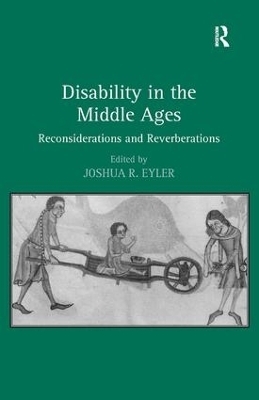
Disability in the Middle Ages
Routledge (Verlag)
978-0-7546-6822-0 (ISBN)
What do we mean when we talk about disability in the Middle Ages? This volume brings together dynamic scholars working on the subject in medieval literature and history, who use the latest approaches from the field to address this central question. Contributors discuss such standard medieval texts as the Arthurian Legend, The Canterbury Tales and Old Norse Sagas, providing an accessible entry point to the field of medieval disability studies to medievalists. The essays explore a wide variety of disabilities, including the more traditionally accepted classifications of blindness and deafness, as well as perceived disabilities such as madness, pregnancy and age. Adopting a ground-breaking new approach to the study of disability in the medieval period, this provocative book will interest medievalists and scholars of disability throughout history.
Joshua R. Eyler is an Assistant Professor of English at Columbus State University in Columbus, Georgia, USA.
Contents: Introduction: breaking boundaries, building bridges, Joshua R. Eyler; Part 1 Reconsiderations: Disability and the suppression of historical identity: rediscovering the professional backgrounds of the blind residents of the Hôpital des Quinze-Vingts, Mark P. O'Tool; 'O sweete venym queynte!': pregnancy and the disabled female body in the Merchant's Tale, Tory Vandeventer Pearman; Playing by ear: compensation, reclamation, and prosthesis in 14th-century song, Julie Singer; Representations of disability in the 13th-century Miracles de Saint Louis, Hannah Skoda; The exemplary blindness of Francis of Assisi, Scott Wells; Experience, authority, and the mediation of deafness: Chaucer's Wife of Bath, Edna Edith Sayers; Protecting or restraining? Madness as a disability in late medieval France, Aleksandra Pfau; Representations of disability:the medieval literary tradition of the Fisher King, Kisha G. Tracy; 'Ther is moore mysshapen amonges thise beggeres': discourses of disability in Piers Plowman, Jennifer M. Gianfalla; Kingly impairments in Anglo-Saxon literature: God's curse and God's blessing, Beth Tovey; Difference and disability: on the logic of naming in the Icelandic sagas, John P. Sexton. Part 2 Reverberations: Henryson's textual and narrative prosthesis onto Chaucer's corpus: Cresseid's leprosy and her schort conclusioun, Andrew Higl; A medieval king 'disabled' by an early modern construct: a contextual examination of Richard III, Abigail Elizabeth Comber; Aging women and disability in early modern Spanish literature, Encarnación Juárez-Almendros; Bibliography; Index.
| Erscheint lt. Verlag | 28.6.2010 |
|---|---|
| Verlagsort | London |
| Sprache | englisch |
| Maße | 156 x 234 mm |
| Gewicht | 612 g |
| Themenwelt | Geisteswissenschaften ► Archäologie |
| Geschichte ► Allgemeine Geschichte ► Mittelalter | |
| Geisteswissenschaften ► Sprach- / Literaturwissenschaft ► Anglistik / Amerikanistik | |
| Geisteswissenschaften ► Sprach- / Literaturwissenschaft ► Literaturwissenschaft | |
| Studium ► Querschnittsbereiche ► Geschichte / Ethik der Medizin | |
| Sozialwissenschaften ► Soziologie | |
| ISBN-10 | 0-7546-6822-3 / 0754668223 |
| ISBN-13 | 978-0-7546-6822-0 / 9780754668220 |
| Zustand | Neuware |
| Informationen gemäß Produktsicherheitsverordnung (GPSR) | |
| Haben Sie eine Frage zum Produkt? |
aus dem Bereich


